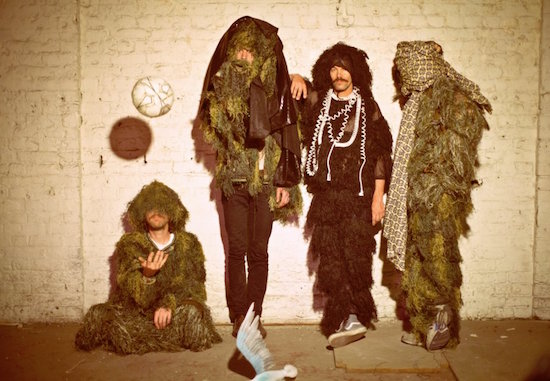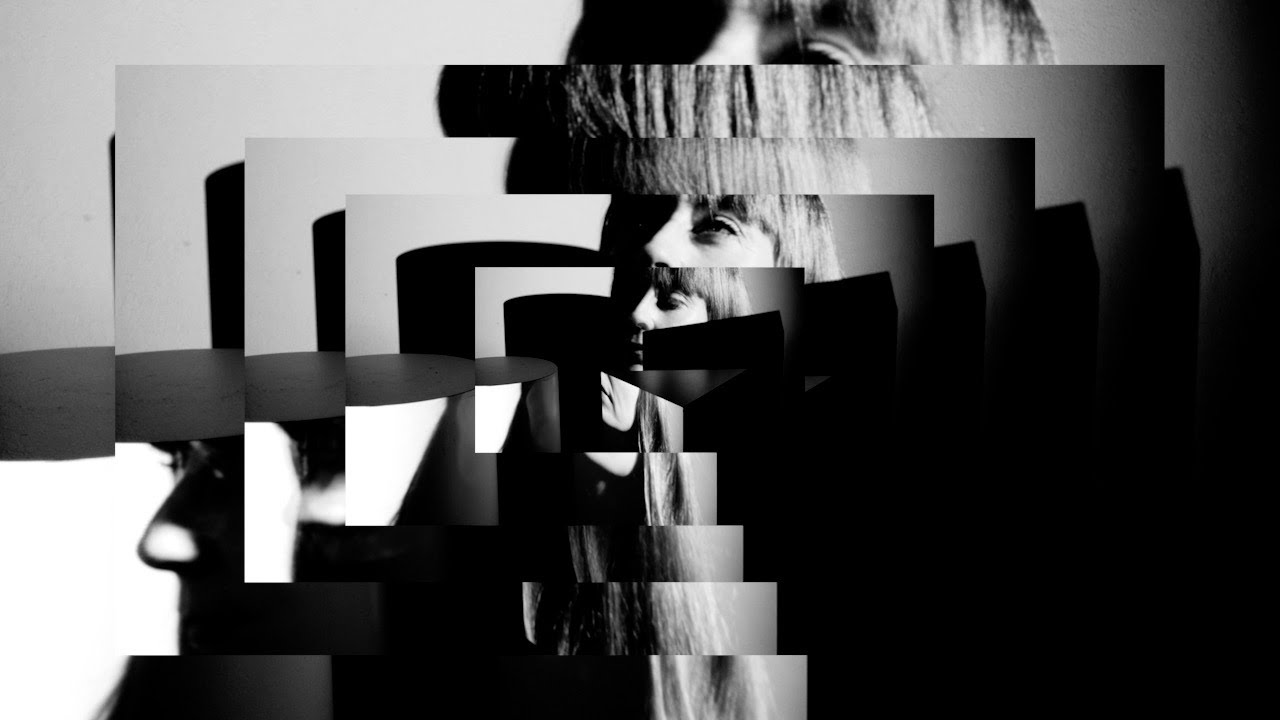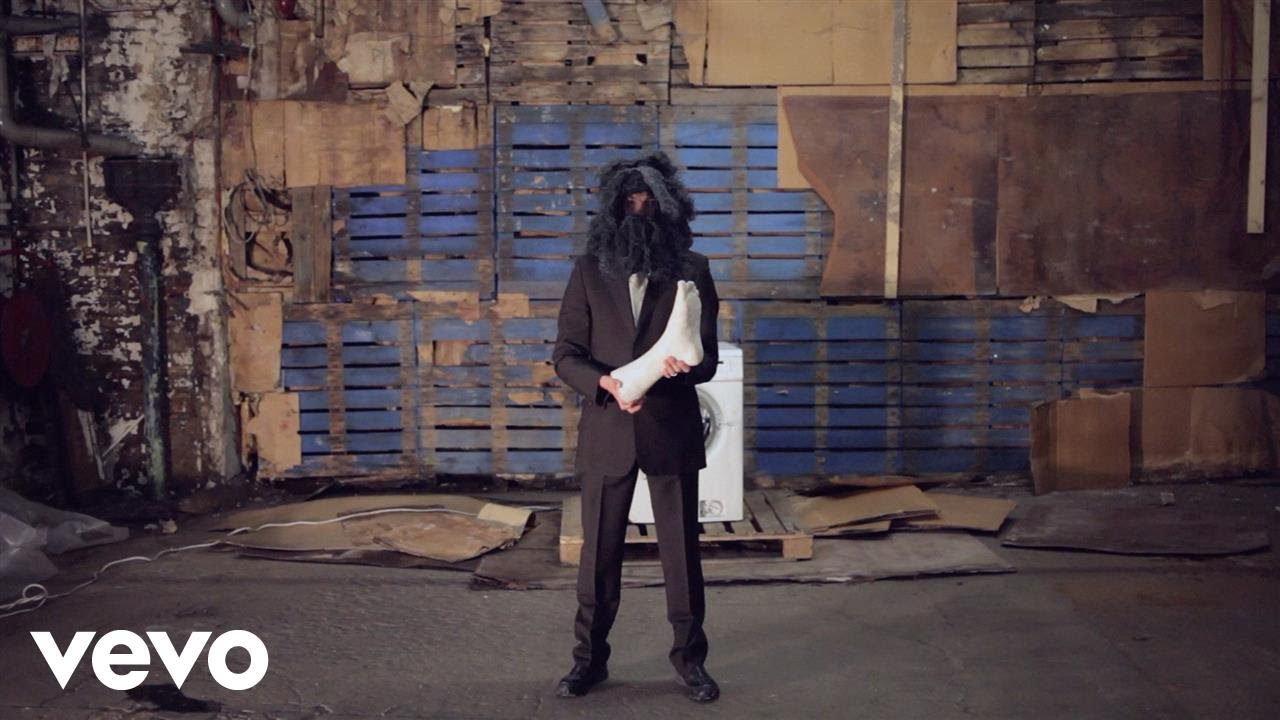Unless you count Kula Shaker’s 90s indiscretions or the vast collection of Third Reich memorabilia owned by ex-Hawkwind bassist Lemmy "I just liked the clobber" Kilmister, psychedelic musicians have tended not to flirt with fascist ideas or imagery. It crops up from time to time in other genres, doesn’t it? Hardcore punk, post-punk, industrial rock, power electronics, pop, glam, most strands of heavy metal, even ska and hip-hop have all had their share of rightwing whoppers trying to muscle their way into the scene and ruin everybody else’s inclusive liberal fun.
Skinheads, neo-Nazis, alt-righters, white nationalists, whatever these dumplings call themselves on their bilious messageboards on any given month, they’ve never made any sustained effort to infiltrate the psych-rock scene. Not as far as I’m aware, anyway. Psychedelia is too abstract and ambiguous. Nazis prefer things that are simple, straightforward and easy to march along to, like Skrewdriver, for example, or Wagner. Try marching to Acid Mothers Temple and you won’t find yourself goosestepping proudly into colonial lebensraum. Most likely you’ll end up sauntering round in circles in a small forest brimming with colours so vibrant it’s as if they’ve splashed straight from Hockney’s palate while a giant talking caterpillar giggles on a toadstool.
The American racist Richard Spencer, whose face attracts punches like pollen does bees, is an unrequited fan of Depeche Mode, a band so non-hippyish they’ve worn nothing but black since 1984. Presumably Spencer was drawn to both the Nazi Party and Basildon’s finest synth botherers on account of the brazen homoeroticism of their respective uniforms.
Spencer and his odious ilk will find there’s little effective recruiting to be done where a prospective audience is more interested in being far out than far right. Nobody would’ve been forced to gaffer tape their diced arm back together or whack a pit bull in the face with a microphone stand if Jeremy Saulnier’s 2015 horror flick Green Room had been set at a psych-rock gig instead of a skinhead-friendly hardcore club. Worst-case scenario, The Horrors might’ve turned up to showcase new material.
Granted, there is some crossover between flower-power counterculturalism and the more paranoiac, conspiracy theorist and libertarian end of the political spectrum. I’ve not seen all of the new Twin Peaks episodes yet but Dr Jacoby seems a case in point, albeit an entirely fictional one. It’s a little known fact that the flame-fanning token rightwing TV pundit Ann Coulter is not just a talking head but also a deadhead. That is to say, Coulter claims to have seen The Grateful Dead perform over 60 times and professes to own 50 of their concert recordings. If only she’d let her Aryan hair extensions down a little further by toking the odd doobie or siphoning a sample of Mr Garcia’s quality acid supply, the experience might have opened Coulter’s mind to such radical concepts as kindness or love.
The psychedelic scene may still be a predominantly white boys’ club, too concerned with imaginary colours and dainty finger cymbals to be actively progressive rather than just apathetic. Even so, it’s difficult not to recognise psychedelia’s clear moral superiority to non-psych genres. It is, in fact, a veritable über-genre acting as a noble guiding light which will lead the way towards humanity’s collective enlightenment. It is a genre thus far unblemished by malign and corrupting outside influences. We must protect its inherent purity and help spread its righteousness across the globe. Join me, oh followers, as we absorb, or else CRUSH, all other musical genres in our wake. It is our psychedelic destiny, people.
Oh wait.
(Postscript: I was once called a fascist for politely asking somebody to cease talking through every single song at an acoustic Julian Cope gig but let’s save that anecdote for another column.)
Wolf Eyes – No Hate
(Self-release via Bandcamp)
Detroit’s gnarliest noise-trippers released this album shortly after the 32-year-old activist Heather Heyer was killed by a car murdered by a Nazi while counter-protesting the white nationalist rally in Charlottesville last month. No Hate was made available to download for free with its creators encouraging listeners to donate to a Go Fund Me campaign set up for Heyer’s family. Donations to that fund quickly surpassed its original goal several times over and the page is no longer active. At the time of writing, there is a still-active page for donating to other victims of the attack, of which Wolf Eyes would no doubt approve. It can be found here: https://www.gofundme.com/united-cville-victim-relief
This capsule may read more like a news item than a review but it’s for a good cause and we can’t let ourselves by bullied by fascists or their apologists and enablers. After all, Wolf Eyes’ style is one of many musical equivalents of the kinds of confiscated visual artworks that were displayed by Hitler and his cronies at The Degenerate Art Exhibition of 1937. No Hate consists of six tracks of ambling jazzy beatnik weirdness which vaguely resemble a sentient slinky climbing itself up a staircase surrounded by shadows of large spidery skeletons with hairy dribbling faces. Donate and enjoy.
Chris Forsyth & The Solar Motel Band – Dreaming In The Non-Dream
(No Quarter)
If the presidential election of the world’s most narcissistic satsuma hasn’t quite resulted in the foretold explosion of high-quality protest punk music the likes of which we have not witnessed since The Exploited or whoever it was railed against the Reagan-Thatcher alliance, then discontent has at least been seeping into various bands’ output in an altogether more subtle and tasteful manner. See, for example, Trans Am’s recent California Hotel LP which was recorded just as Mr Drumpf was sailing to victory and is available in a vinyl edition coloured so brightly orange it’s as if it were dyed using the president’s own personal supply of industrial-strength arse tan.
Chris Forsyth’s Dreaming In The Non-Dream was also recorded in response to that watershed moment when America’s most bibliophobic crotchgrabber become leader of the free world. The resulting four-track LP may be more concise than last year’s double album (The Rarity Of Experience) but it sure don’t sound like Crass. Reminiscent of Dave Shuford, who transitioned from playing with the experimental freestyle collective The No-Neck Blues Band to smoothing down and chilling out as D Charles Speer and then with his Rhyton trio, Forsyth is another virtuoso who’s ditched abstract new-weird skronk-scrapings to embrace accessible 70s rawk vibes without sacrificing integrity or going all Peter Frampton on us. Reacting to the giant wall-promising apricot in the best way he knows how, Forsyth has picked up guitar and shredded out licks that recall Crazy Horse, Television, Frank Zappa, Endless Boogie and Jerry Garcia. Peter Kerlin and Ray Kubian provide the rhythmic backbone and there is the additional odd brassy climax, moment of jazz-funk fusion and flurry of discordant noise. For the most part Forsyth lets the instrumental music and his song titles do the talking, although there’s the welcome addition of throaty vocals on the blues-rock walloper ‘Have We Mistaken The Bottle For The Whiskey Inside?’. Forsyth winds to a close with ‘Two Minutes Love’, its title a twist on the Two Minutes Hate from Orwell’s 1984. Maybe if we all spent two minutes per day listening to this Ry Cooder-ish instrumental while watching pleasing footage of kittens on a cinema screen before all hugging each other and promising to get along better then we could mass brainwash ourselves into being a kinder society. It’s definitely worth proposing at the next meeting of your local branch of the Psychedelic Democrat Party.
King Gizzard & The Lizard Wizard / Mild High Club – Sketches Of Brunswick East
(Flightless/Heavenly)
King Gizzard have released so many albums I already have enough words on them from these columns to publish a slim volume titled JR Moores On King Gizzard & The Lizard Wizard so I can flog it in a limited print run from a pledgestarter website with incentives such as signed copies and an embossed Quietus bookmark. Sketches Of Brunswick East is a departure from the warp-speed space rock that Gizzard honed on their first two records of 2017 and the one before that. It’s also a collaboration with Mild High Club, the recording nom de plume of Los Angeles resident Alex Brettin, whose two exceptional LPs of stoned bedroom psych pop (with the occasional sprinkling of background jazz) earned their place in previous editions of Columnfortably Numb. Complementing one another as deliciously as gin and tonic, cheese ‘n’ onion or Cheech & Chong, the two acts have concocted a concise an’ mellow lite-funk lounge-bop fusion sound influenced by Ethiopian music of the 60s and 70s, Miles Davis and Brazilian Tropicália. As one Reddit user described it so very eloquently, "This sounds like the Robert Crumb ‘Keep On Truckin’ guy if he was taking a stroll through Sesame Street a couple of years into a societal collapse." Couldn’t have put it better myself. Give that kid a column.
David Nance – Negative Boogie
(Ba Da Bing)
I don’t know much about David Nance but I know what I like to think people who aren’t like me don’t like to listen to very much at all. Judging from this particular recording, Nance couldn’t be any more badass if he had each of half of that six-letter portmanteau tattooed on the cheeks either side of his bumhole. Badass with a capital B and an orifice in between the D and the second A. And the hole in the middle there, well it’s shouting and slurring and yelping and spitting and acting all belligerently hollersome, like David Yow one minute and Jimbo Morrison or Jon Spencer the next, on subjects such as a sorry old protagonist who’s failing to go straight and people pissing their pants at the riverside. My sincerest apologies. Everything’s gone a bit Bill Burroughs with that botty talk hasn’t it? That’s the effect Nance’s music will have on your psyche. With its minimalist bassline and malevolent geetar scratchings, Negative Boogie‘s opening number really is as feral as the blooming Jesus Lizard or thereabouts. Nance lightens up afterwards but even his catchier or more laidback numbers are riddled with ugly background static, solos that sound like J Mascis trying to strangle an amplifier after having his digits severed, and delirious voices shouting from the cupboard under next door’s stairs. A recent interview with Noisey informs me that the dude’s only 29 years young. What a bright brown future he must have ahead of him.
Curanderos – Curanderos
(Fire)
Regular readers of this column will be aware of the infrequently acknowledged truth that Bardo Pond are the greatest psych-rock group of all time. That is not to mention their placement in the Top 5 best bands of any genre from any era alongside Sonic Youth, Earth, The Beatles and Wolf Eyes (actual order subject to change). Once you’ve got to resin-fingered grips with the Philadelphian alchemists’ main catalogue, it’s then time to graduate to the Bardo members’ myriad side-projects. These include Hash Jar Tempo, 500mg, Alasehir, Alumbrados, Prairie Dog Flesh, Moon Phantoms, Baikal, Vapour Theories, LSD Pond and Third Troll. Curanderos happens to be a collaboration between Bardo Pond siblings John and Michael Gibbons, drummer Scott Verrastro from Kohoutek, and erstwhile BP synth dude Aaron Igler. It was recorded back in 2006, mixed 10 years later, originally released earlier this year in a fancy gold vinyl pressing for Record Store Day, and is now available for those of you who’ve remained faithful to the good old compact disc format for whatever mad reason that might be. (I like the fact that CDs don’t take up as much shelf space as their unwieldy but superiorly crackling vinyl cousins yet are still a physical thing that you can hold and caress with your hands or maybe brush against a cheek because I don’t have any pets.)
Across these two 20-minute improvisations, the Gibbons brothers’ guitars will wrap their multi-pedalled distortion round your body like a big warm woven blanket as echoing drums crash and tinkle away and the electronics drone, hum and flutter in and out of view. The second side of free-psych noise is the more spidery and abstract of the pair but equally as immense as the first. What I love most about Bardo Pond and all their extracurricular activities (and what I love most about Dylan Carlson’s Earth, incidentally) is the way their music can genuinely slow down your heart’s pulse and, it appears, slow down time itself. That’s a feeling I crave more and more often these days. It makes the precious gift of life last longer. Just ask Dunbar from Catch-22. No wonder it took Michael Gibbons a decade to finally get round to mixing this beast.
Beaches – Second Of Spring
(Chapter Music)
Earlier this year, Kompost by Flowers Must Die showed a group at the peak of its powers mastering a broad range of different psychedelic styles within the space of a single LP without losing a sense of overriding coherence. Beaches’ third album is similarly impressive. Technically in their case this is a double LP but it’s still quite some feat. Across Second Of Spring‘s 17 tracks, the Melbourne-based quintet straddle post-punk, shoegaze, kosmische musik, new wave and plenty more besides. Sometimes they’ll resemble a chugging psychgaze outfit from Chile. On other tracks, particularly the instrumental intermissions, Beaches flaunt an altogether gothier or 4AD-ish rainsoaked post-punk feel. One moment they’ll remind you of Ride, next it’ll be cult noughties heroes Electrelane, then perhaps The Jesus & Mary Chain. On ‘September’ they’re like The Fall right at that sweet moment when Brix Smith’s suave US nous began to fully take hold. Its neighbouring track, ‘Be’, has something of the old L7 swagger if only the sneering LA muff-flashers had been indebted to shrooms and Slowdive rather than speed and Sex Pistols. Later on, the gorgeous bubblegum alt-rock of ‘Arrow’ rivals anything offered of late by either Pixies or The Breeders.
While the album’s woozy vocals, mesmeric basslines and rich assortment of heady textures are all rather splendid, Antonia Sellbach’s guitar work really stands out as Beaches’ pièce de résistance. Depending on her mood, Sellbach’s lead parts are as enticingly inventive as those of George Harrison, Joey Santiago, Tom Verlaine, whoever it was who played on The Cure’s best tracks, and several other axe fingerers to boot. That’s probably too many comparisons isn’t it? Artists tend to dislike comparisons as it neuters said artist’s own valiant originality. Beaches are very good. They are not derivative. Buy their record. Dig it. Dig it. Dig it like a sandcastle moat.
Oh Sees – Orc
(Castle Face)
Thee Oh Sees have dropped the "Thee" from their name and apparently now wish to be known simply as Oh Sees. I have a good mind to adopt that disowned "Thee" and raise it as my own. Henceforth, I demand that my byline reads Thee JR Moores so that I come across as even more of a despicable turnip. Lesser critics often label John Dwyer’s group as "garage rock" but you couldn’t fit two full drumkits inside any garage I’ve been lucky enough to set foot in. I don’t move in the right circles to be welcomed into the kind of car-house vast enough to accommodate the collection of fancy automobiles owned by Mr Jamiroquai. Garage rock is also a glaring misnomer because Thee Oh Sees are evidently prog as fuck. For starters, their umptillionth album is called Orc and it has an illustration on its sleeve of a big old purple orc’s head. You couldn’t get any more prog if a becloaked Rick Wakeman popped round for a pot of magic tea with a tupperware full of butterfly cakes and an audiobook boxed set of Robin Hobb’s The Assassin’s Inherited Shaman Renegade Dragon Travels pentalogy.
Oh Sees may play breakneck punkish prog yet it is prog all the same and playing it at such a breakneck punkish pace makes it all the more impressive. I realise that prog is all too often more impressive per se than genuinely enjoyable but Oh Sees are an irrefutable hoot. Orc is packed to its rafters with netherwordly vocals complete with impish yelps, greasily distorted riffs interspersed by squealing solos, that signature double-drummer beat onslaught, trippy string arrangements, the paradoxically reassuring sound of laser blasts and lyrics addressing castles, warriors and other Tolkienian concerns. None of us would begrudge the success of Muse, whose daft compositions their followers insist are both impressive and enjoyable, if they were as talented and intuitive as Oh Sees. Take note, Matthew Bellamy, and improve forthwith.
Snapped Ankles – Come Play The Trees
(Leaf)
"This is what dance music will sound like when computers finally fail us," say Snapped Ankles. What? Like Animal Collective challenging Grumbling Fur to a duel while Angus Andrew of Liars fame roasts one of those recent Pop Group LPs on the campfire in an abstract attempt to attract the attention of LA’s Not Not Fun label? Fair enough. Snapped Ankles claim to have emerged from the forest. They take vintage analogue synthesizers and strap ’em to logs. At live performances, they look an awful lot like an especially mossy Mighty Boosh skit. Is Come Play The Trees any good? Do Snapped Ankles shit in the woods?
Next time: what to do when a stranger suddenly compares you to Hitler at an intimate concert by the ex-Teardrop Explodes frontman (hint: remaining extremely calm will infuriate them further)




